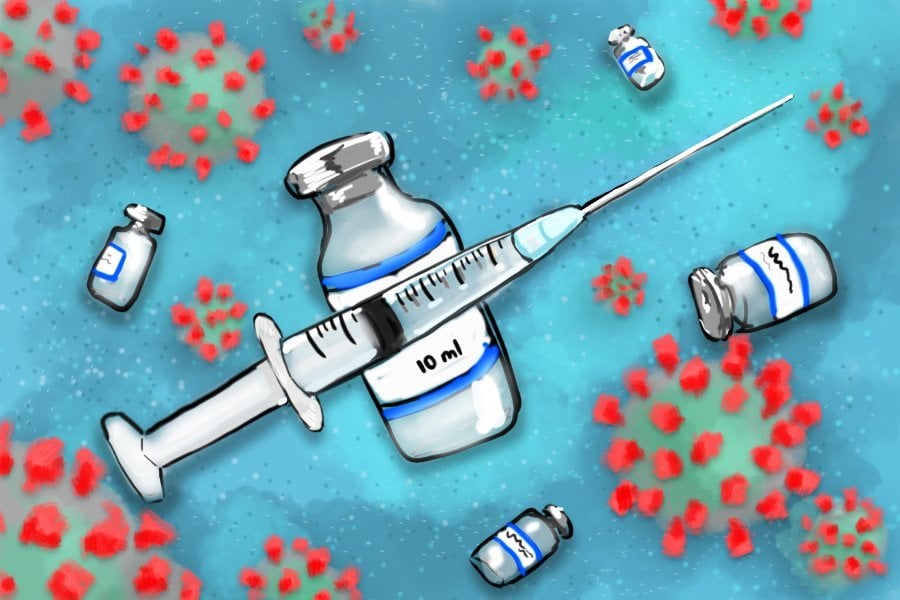As eligibility varies across the state, Evanston residents struggle to secure local vaccination appointments
Daily file illustration by Hank Yang
COVID-19 vaccination accessibility remains an important issue as the State of Illinois expands eligibility to all residents over the age of 16 on April 12
April 12, 2021
When Chris Granner, 63, became eligible for the COVID-19 vaccine, he jumped on the opportunity to register through the city of Evanston’s website — but soon realized he was not going to find an appointment in Evanston, or at least not quickly.
After hearing Mayor Steve Hagerty’s recommendation to find vaccines elsewhere due to an insufficient allotment from the state, Granner tasked his daughter with finding him an appointment. She found an open slot in Quincy, Illinois — nearly a five hour drive from home.
“When she asked me, ‘Should I book the appointment for you?’ I considered for about five seconds, and said yes,” said Granner, who qualifies as part of the state’s 1B+ priority group.
Like Granner, many Evanston residents have faced difficulties finding appointments nearby — prompting them to travel to clinics in less populated areas of the state, including Danville, which was previously accepting walk-in appointments to anyone over the age of 18.
Prior to April 12, vaccine appointments in Evanston have only been open to individuals 65 years and older, essential workers and individuals 16 years or older with preexisting health conditions, prompting the influx of travel for vaccinations. However, not all Evanston residents have the resources to take a day off and travel hours away to receive a vaccine.
As vaccine distribution across the greater Chicago area ramps up, residents have raised questions about accessibility and equity. As of March 30, first dose vaccines have been distributed to 34 percent of White Chicago residents, compared to 24 percent of Latinx residents, 20 percent of Black residents and 30 percent of Asian residents. Native American residents were not included in the city’s data.
Jennifer Kouba, associate director of development for Connections for the Homeless, said in an email Connections for the Homeless’ frontline staff and unhoused shelter residents received the vaccine a month later than originally promised. It was only through advocacy from Interfaith Action of Evanston and Connections that Evanston’s Health and Human Services Department hosted the organizations’ combined vaccine clinic.
Kouba said there is an inherent equity issue in urging residents to leave town for vaccine appointments because not everyone has access to the transportation or internet necessary to identify available vaccines and travel to receive them.
“We very much appreciate the adjustments the City made, but Connections did not find the original vaccine rollout plan to be equitable,” Kouba wrote.
Community leaders have also worked with the city’s health department to begin improving vaccine access. On Apr. 7, Evanston’s Second Baptist Church, in partnership with the State of Illinois, Evanston and NorthShore University HealthSystem, hosted a vaccine clinic focusing on hard-to-reach communities. Through the clinic, the church was able to administer all 200 vaccine doses supplied.
Jared Davis, a member of Second Baptist Church, said he appreciated the convenience and comfort of being vaccinated in his own church, located around the corner from his workplace.
“It was pretty simple and painless, and it was efficient,” Davis said. “The nurse that gave me my shot… was very personable and made me feel relaxed.”
Rev. Michael Nabors of Second Baptist Church said the church is uniquely situated within the community because of its connection to many longtime Black and brown residents, some of whom may be hesitant to receive the vaccine. Members of the church, he said, prioritized reaching out to residents and other minority churches in the 5th Ward.
They focused on reaching people who may not have the resources to travel out of Evanston to receive the vaccine. Similarly, event organizers attempted to make sure residents knew they could call 311 to sign up for the clinic if they do not have internet access.
Nabors is one of many who have worked with the city to expand vaccination outreach and equitable distribution efforts. As the state opens up eligibility to those aged 16 and older Monday, he said there will be upcoming clinics accessible for all Evanston residents.
“They’re making sure that when the vaccines become available for everybody on April 12, that they have the targeted locations to administer the vaccines,” Nabors said. “To me that’s exciting, and we have worked to make that happen.”
Email: [email protected]
Twitter: @WKlunk
Related Stories:
— The Daily’s COVID-19 vaccination guide: what you need to know and how to get a COVID-19 vaccine
— As vaccine hesitancy threatens to increase COVID-19 disparities, local experts try to build trust


